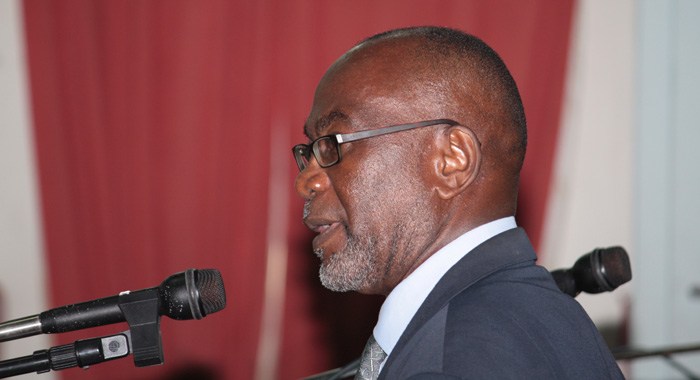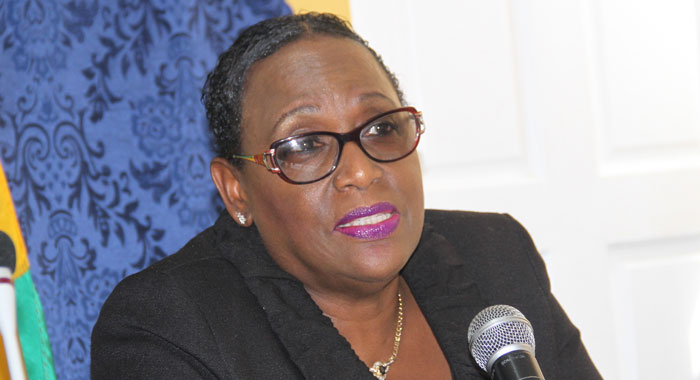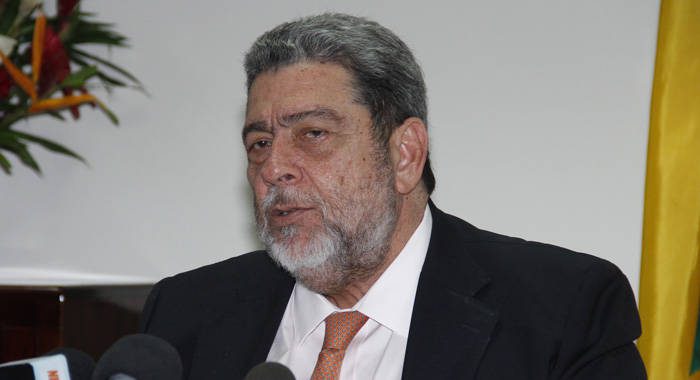Prime Minister Ralph Gonsalves on Thursday showed rare sympathy for citizenship by investment (CBI) programmes across the region, which his government opposes in St. Vincent and the Grenadines (SVG).
Gonsalves has repeatedly reduced CBIs to the selling of passports — “the outward sign of the inward grace that is citizenship”.
He, however, told lawmakers in Kingstown that the European Union’s approach to the region’s CBI amounts to “bullying”.
Gonsalves’ comments came during debate of the International Business Companies (Amendment and Consolidated) (Amendment) Bill, 2018, in which he accused the European Union of bullying small states into enforcing its tax policy.
Observers say that the moves by the EU could have the effect of destroying the offshore finance sector in the region, which has operated under various names in response to blacklisting and threats of blacklisting by the EU.
The sector contributes significantly to some CARICOM economies, including SVG, Barbados, Bahamas, and St. Kitts and Nevis.
Gonsalves told parliament,
“And, Mr. Speaker, you have heard me say that although I do not support, on the grounds of principle and practicality, the matter of citizenship by investment — selling of passports and citizenship, and I am not making a partisan political point here –I have made the point publicly that the manner in which the European Union is going about addressing countries with that question is also one of bullying.
“I don’t have — we can have our argument internally but I am raising the larger question on which we must all be united in this honourable house and in this nation and in the Caribbean.”
During the debate, Gonsalves expressed “controlled anger” at the EU’s action and called for a CARICOM response, saying that while member states had acted individually, it was not too late for a regional response.
“I am very calm and controlled but that does not mean that I am not deeply annoyed and offended. In fact, the members of staff here will tell you I had a telephone conversation with the European Union ambassador. It was robust conversation. Well, robustly largely from my end because every issue she raised, it was of no merit practically or in international law or on a question of principle,” the prime minister said.
CBI, bananas industry contrasted
But the prime minister was not the only one who saw parallels between the offshore finance sector and CBI.
Opposition lawmaker St. Clair Leacock said that Gonsalves had noted that St. Kitts and Nevis was standing up to the EU on the tax question, although the language coming out of Basseterre was less robust.
“Because they have stood up for near 40 years with the citizenship by investment programme,” said Leacock, a member of the main opposition New Democratic Party, which has said it will re-introduce a CBI programme if elected to office.
He said the 40-year duration of Basseterre’s CBI programme is about as long as the banana industry in SVG.

Leacock said this goes to demonstrate “that the citizenship by investment programme is sustainable because 40 years is as long as any agricultural monocrop in this country has survived, bananas being our best experience.
“And look at the difference and the quality of life that the people of St. Kitts are experiencing today: extra salaries, bonus salaries. We speak about seven flights here per week in St. Vincent; they are speaking about 10 per day in St. Kitts, half the size of St. Vincent and the Grenadines.”
He said that St. Kitts and Nevis enjoys these benefit “because they have stood up and fought back on a principle that there was significant financial and economic benefit to be gained from a legally constructed industry: the citizenship by investment programme that we have scoffed at.”
Leacock further said:
“And we can’t have it both ways. We can’t say that here in St. Vincent we are taking issue with the OECD and the European Union with the same legislative industry, finance industry and then turn around on the other side and say the one in St. Kitts or throughout the region, the citizenship by investment is not good. We can’t probate and reprobate. So we have to get our own act together. In fact, I think it is the closest the Honourable Prime Minister has ever come to agree and accept that even on that programme there is bullying.”
In response to some cross talk, Leacock said:
“The programme has the same exposure as this programme of diligence exercise.
“It’s the same thing. It’s the same thing. And whether we want to speak about one man coming through or two, or three or 500 or 5,000, forget about Manafort, forget about Loyal Bank, forget about Ames, forget about Nano and the list goes on, all of these people come by way of citizenship through international or significant investment in our countries. But I am not here today to argue for the CBI programme because I have already stated that I am on that soca boat and we are on that boat because we are satisfied that it could make for a better life for St. Vincent and the Grenadines.”
‘Hypocritical’
During the debate, opposition senator, Kay Bacchus-Baptiste said that the offshore finance sector was not very different from CBI.
“It is a way that small islands have to use to carve out revenue and at the time the offshore business was the way to go and I remember when much money was made from it and it is the same thing they are going to do with the CBI — citizenship by investment. We have to protect our industry and we have to find a way to deal with it.”
Bacchus-Baptiste said that when she says she sees no difference, she means to say “that on the one hand, I support the international business but I don’t support the CBI, I think it is hypocritical” – an apparently reference to the approach of the prime minister.
“For example, a lot of these persons who had offshore businesses here, like Baron, got Vincentian passports. Say, for instance, even Ames. His was not offshore but I am saying it is hypocritical on one hand to criticise it and then give out passports to non-Vincentians investing and doing business here.”
Adrian Baron, naturalised-Vincentian, in September became the first person to be convicted for failing to comply with Foreign Account Tax Compliance Act (FATCA) of the United States.
Baron is a former chief business officer and former chief executive officer of Loyal Bank Ltd, an off-shore bank with offices in Budapest, Hungary and St. Vincent and the Grenadines.

However, the prime minister, in response to Bacchus Baptiste, said there are “different regimes for granting citizenship”, noting that one of them is to be resident in SVG for at least seven years and have a connection of some kind.
“It would be business, it could be just living,” said Gonsalves, adding, “And that is the manner in which, as I recalled it, that Mr. Baron obtained his citizenship.
“Not by selling a passport or selling it upfront,” said Gonsalves, who has ministerial responsibilities for the granting of non-automatic citizenship
“In the case of Mr. Ames, under the citizenship act, if you are — which incidentally, I met there — if you have invested substantially in the country, you understand the English language and all the rest and so on and so forth and you are here for five years minimum, you can get citizenship that way. That’s an entirely different matter than citizenship by investment. I just want to point out the legal difference, apart from other differences,” Gonsalves said.
‘a distinction without much of a difference’
Bacchus, Bacchus, however said that what the prime minister mentioned was “a distinction without much of a difference in actual fact.
“That’s my opinion and the opinion of a lot of persons. As small island states, we have to find our way to carve out, legally, to make ends meet.”
Bacchus Baptiste said she believes that these international business companies were attracted to SVG and other islands because there were no taxes.
“That’s one of the main reasons that attracted them to us. So this particular bill, which is now imposing taxes on IBCs, I think actually spells the death knell for the business in St. Vincent. And it is not only my opinion. It is the opinion of the agents who are working in the industry.
“So it is one thing to say it will not or to hope that it will not, but unless we can find another way to attract them, another purpose, there will be no reason for them to come to St. Vincent,” she said.







I wonder where all the money goes from the secret CBI program that we have in SVG? The denial of its existence means there is certainly NO accountability of the funds that are derived from it.
Good point, lets hope that someone is listening and is willing to address your onus.